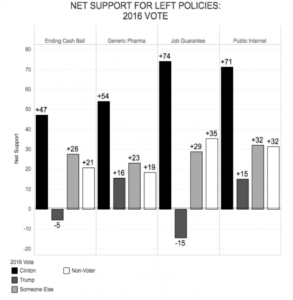- Polling for the Left Agenda, Data for Progress
- “We find that the punditry has vastly underestimated the potential of an unabashedly left progressive agenda. Four issues stood out in our polling as issues that have strong and durable support.”

- From The Intercept: Polling Shows Running on Progressive Policies Would Work In Swing Districts:
- “Policies dealing with cheaper prescription drugs, infrastructure, protecting Social Security and Medicare, and cracking down on Wall Street, are exceedingly popular with swing and surge voters alike, the survey found.”
- “A majority of voters (52 percent) said they would be more likely to vote for a candidate talking about the progressive policies we mentioned, while only 26 percent would be less likely.”
- “The results show enthusiastic support for progressive policies in 30 swing districts, mostly held by Republican incumbents. “Our polling shows running as a bold progressive is a political winner.’”
- “A majority of the voters surveyed preferred a bold economic vision, as opposed to an incremental approach. When asked, 52 percent said they prefer “a bold and comprehensive agenda to rewrite the rules of the economy,” compared to the 36 percent of voters who would choose to “make our economy work for everyone by building on the success of the past.”
- “Majorities of Americans say the federal government does not provide enough help for older people (65%), poor people (62%) and the middle class (61%). By contrast, nearly two-thirds (64%) say the government provides too much help for wealthy people.”
- From Greenberg Research study, 2018: At a Breaking Point?:
- “Democrats only reach House-control level margins when they: Make Donald Trump, not the GOP, the focus of their attacks and focus not on his temperament, but rather on his failure to keep his promise to end politics as usual, passing trickle-down tax cuts and threatening the middle class with cuts to Medicaid and entitlements.”
- “Focus groups have shown that “the best mid-term attacks include Trump’s broken promises: contrary to his vow to not be a typical politician, he has made a series a U-turns, enriched himself, given massive tax cuts to the rich and him personally—and hurt the most vulnerable, like massively cutting Medicaid, Social Security and Medicare. These attacks on Trump’s “broken promises” raised very serious concerns with over 50 percent of African Americans, Hispanics, unmarried women and millennials.”
- “…it is critical that Democrats run as change agents who want to take on the way Washington works so it finally helps the hard-working middle class, not the rich and powerful and corporations who are rigging politics so they get more trickle-down economics – like the new tax cut. This evolution of this ‘better deal’ message has been developed over several waves of focus groups and survey research…it is particularly strong with the African American and Hispanic voters who are so desperate for change, but also the unmarried women and millennials who are turnout targets.”
- From Oxfam study, Polls Show Trump Economic Agenda Deeply Unpopular:
- “…the four most popular policies for decreasing inequality among the Americans surveyed include providing free and high quality education and medical care for all, raise taxes on the rich, raising the minimum wage, and increase funding for safety net programs like social security, Medicaid and nutrition assistance.”
Pledge Polling Research 041818Pledge Polling Research 041818Pledge Polling Research 041818
- The Democrat’s “Working Class Problem”, The American Prospect, 06/01/17
- “When we tested a bold Democratic economic agenda against the Republican agenda, white unmarried women embraced the Democratic offer with great enthusiasm, and this agenda trailed the Republican offer by only 8 points among all white working-class women. The results were so promising, we proposed at the outset of the 2016 cycle that progressives adopt an “RAE+” strategy to reach the working class more broadly.”
- “Not surprisingly, white working-class women form a big portion (40 percent) of the independents and Democrats who voted for Trump in the end”
- “‘Jobs don’t pay enough to live on and it is a struggle to save anything,’ said 70 percent of minorities and 65 percent of unmarried women in our postelection survey.”
- “The failure to see that the problems of working America run right through the new American majority cost the campaign a chance to produce a very different result in this election.”

